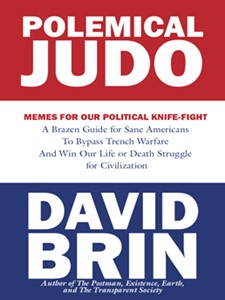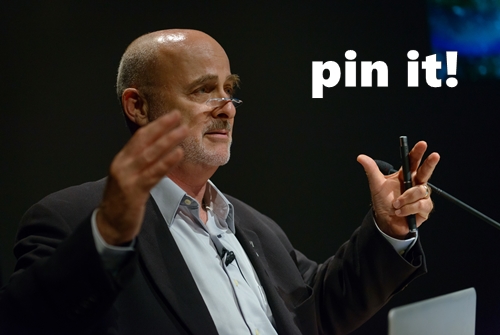This is the first half of Chapter Two. If you're looking for Chapter 1, click here, or read the final chapter at David Brin's blog Contrary Brin.

This phase of the U.S. Civil War was not of our choosing. But we've been complicit. First, by accepting many indolent assumptions. Also by ignoring history.
Take the lesson of the Greatest Generation. As we'll see in Chapter 3, our Roosevelt-era parents and grandparents overcame a mélange of would-be plutocrats, populist tyrants and commissars to craft a social contract that unleashed a confident, burgeoning middle class, spectacular universities and science, vast infrastructure and entrepreneurship — plus a too-slow but ponderously-growing momentum toward justice.
It was so successful that we forget how rare and special it all was! We members of the Boomer Generation largely assumed (and still assume) that age-old cheater plagues like oligarchy and feudalism — dominant across nearly all of the last 6000 years — were banished for good.
They weren’t. Today's worldwide attempted oligarchic putsch is both lethally dangerous and boringly predictable. As Hannah Arendt taught, evil can be oafish and banal, while also feral-canny. But one thing villains are instinctively good at is setting decent people against each other.
So let’s dig down to undercurrents that most of us share. Our enlightenment experiment is founded on some notions and practices that were never extensively practiced till recently — common threads that are masked by our dismal obsession to couch everything in left-right terms. For example, if pressed, most Americans would avow:
that men and women of goodwill should negotiate in good faith — either directly or through representatives — each giving a bit in order to achieve positive-sum [1] outcomes;
that leaders are not the same thing as the state — they can and should be frequently replaced;
that the rule of law must be applied evenly, fairly and transparently... though we can also change faulty laws — fairly and transparently;
that money and power often corrupt;
that whatever is not explicitly forbidden — via duly deliberated laws that can always be questioned — is automatically allowed [2];
that a mature/sincere person should at least consider the foremost — even sacred — tenet of science: I might be wrong;
that prejudices believed by our parents — and those clutched by us today — might be disproved by facts, at which point it's time to let them go;
that expertise and intelligence don't guarantee wisdom, but knowledge and skill merit respect.
Moreover, if you couch it right, you can also get folks across a wide-spectrum to admit:
that competition and cooperation are not opposites. Humans are inherently competitive beings and competition engenders creativity... but competition is nearly always wrecked by cheating, unless we cooperatively come up with rules and referees to keep it fair;
that most 'liberal' endeavors — at least those aimed at uplifting children — need little more justification than "stop wasting talent."
It’s a safe guess that you’d credit yourself with holding all those views... while denying that your opposition-neighbors do. But try asking: Aren't they as likely to claim that you don't?
In fact, all of the nostrums listed above are fundamental to our new kind of society, though you’ve likely not seen them expressed that way. Which is the point here. The first step in bridging our chasm is to escape loaded terminology.
even more basic than that
Now let me surprise you by saying other themes run deeper than those above, distinguishing America and its allies from the rest of human history. For starters, can you name any other society that raised its own children to relentlessly criticize their own tribal elders? The way that you — yes, you — have a powerful reflex to criticize?
A relentless stream of propaganda has poured from the indoctrination system known as Hollywood, pushing themes you agree with! Doubt that? Quick then, can you name a popular film you've enjoyed, across decades, which did not promote the following?
Suspicion of Authority
Tolerance
Diversity
Personal autonomy and individuality
Eccentricity
Above all, suspicion of and resistance to unfair authority figures. These are the very traits that enable and empower criticism, of the sort that you — as a politically active person — apply to your nation and its mistakes. It's all part of a critical self-improvement campaign that enabled us to thread (sometimes just barely) a minefield of potential disasters across the last century, achieving many kinds of progress. It is also the trait that — despite every effort of the oligarchs — may yet win us the stars.
Right now you may be simmering, offended by the notion that you imbibed such values from movies, novels and songs, instead of inventing them yourself. Even worse, the effrontery to suggest that your opponent-neighbors might share those same deep reflexes.
Get over it! We don’t have time for self-indulgence. Nor is this the place to explore philosophical implications of such a strange propaganda campaign, so unlike the mythologies of any prior culture. Though elsewhere I’ve called it "The Dogma of Otherness." [3] What matters now is the calamity that's befallen us! Because these memes, which underlie much of our success and our strength, are now being used against us.
Suspicion of Authority (SoA) is reflexive in both liberals and conservatives. Both denounce Orwellian plots against freedom and light. But they part company over which groups aim to be Big Brother.
Conservatives fret about power grabs by snooty academics and communists and faceless government bureaucrats.
Liberals see cabals of secret-conniving billionaires and racists and faceless corporations [4].
But when you put it that way, isn't the answer Duh? All power centers are inherently dangerous! At various times, cheaters and would-be tyrants used corporate, or bureaucratic-socialist, or owner-elite centers of power... and if you’ve spent time at any university, you saw mini-despotisms in many departments. Exploiters and cheaters will fester and plot wherever they feel they can. It’s why we finally invented habits and tools of accountability.
Ideally, we'd warily guard each other’s backs, with liberals grudgingly admitting "All right, I am more worried about plutocrats, while you fear bureaucratic excess. Tell you what. I'll listen to you a bit if you'll listen to me."
Ideally. I’ve seen it happen! Though not in 21st Century America. Alas, that synergy shatters amid re-ignited civil war, when each side tells its partisans that freedom can be harmed only from one direction. This political fused-spine disease leaves us unable to turn our heads. A form of tunnel vision, it’s one reason we get trapped into grunting sumo-shoving, instead of thinking two or three dimensionally... helping our neighbors do the same.
If these matters truly interest you, I recommend a brief Socratic questionnaire on ideology [5] that might reveal added dimensions. I promise you won't view the hoary-insipid-lobotomizing "left-vs.-right axis" the same way again.
Our key point here is simple. The putsch-masters need us at each other’s throats, so they exploit the most inherently American meme — SoA — getting us denouncing each other as authoritarian elites!
This book offers many ways to thwart them. The best and most honorable approach? Get our cousins and fellow citizens to admit:
Yes, we share the same instincts and underlying fears.
We differ over particulars.
Might there be some way we both are right?
sez you! everything is relative
Alas, the honorable approach won’t work if anyone using it is already an "enemy." I’ll return often to the mad-right’s all-out war on facts and all fact-using professions, a vendetta that diverts the SoA reflex of red Americans toward smartypants "elites" — the scientists, journalists, teachers, doctors and "deep state" officers — who stand in the way of oligarchy's rule. We’ll get to that in Chapter 5.
But here we’re exploring our neighbors' underlying assumptions. And the strongest — that they almost always fall back upon — is: Everything’s a matter of opinion.
Let's say you gather powerful evidence to support your argument — e.g., regarding climate change. Nowadays, your links are instantly canceled with counter-links, and outraged opponents denounce any claim you make for 'credibility.' If you cite specialists, that only makes you a lackey to authority. And don't you know that "experts" are all conformist lemmings? Every fact-checking service is a would-be Orwellian Ministry of Truth.
As Thomas Paine put it, in The American Crisis: "To argue with a man who has renounced the use and authority of reason, and whose philosophy consists in holding humanity in contempt, is like administering medicine to the dead, or endeavoring to convert an atheist by scripture."
But then, that too is citing an authority.
I'll offer several ways to fight these well-tuned defense mechanisms. But only a few of them are potent enough to overcome the final bastion [6] of defensive relativism, one that our parents and grandparents knew all-too well: "Oh yeah? Sez you!"
... And that concludes the first half of chapter two of Polemical Judo.
Now! Purchase POLEMICAL JUDO in trade paperback.
Or purchase POLEMICAL JUDO for the Kindle ebook.
references and notes
[1] No concept is more urgently important than that of positive-sum versus zero-sum (or even negative-sum) thinking. It is the underlying principle of our civilization, distinguishing it from all others. And it is not my purpose here to explain it.
[2] A vast proportion of complex human cultures, perhaps a majority, taught: "Whatever isn't expressly allowed is assumed to be forbidden." Picture a cop demanding: "Who said you could do that! Show me the permission!" You and I assume — if there's no apparent way we're hurting or bothering any people or interests, or imposing any burdens — "Who am I hurting? Show me where it's disallowed!"
[3] "The Dogma of Otherness," in Otherness, by David Brin, 1994. https://www.davidbrin.com/otherness.html
[4] And yes, I suppose — with some reluctance — that makes me a 'liberal.'
[5] David Brin's questionnaire regarding politics, ideology and human destiny. Try it! https://www.davidbrin.com/nonfiction/questionnaire.html
[6] "Don't waste time trying to convince Trump supporters he's repugnant" by Colbert I. King. https://www.washingtonpost.com/opinions/dont-waste-energy-proving-trumps-racism-get-him-out-of-the-white-house/2019/08/16/89883596-bf95-11e9-a5c6-1e74f7ec4a93_story.html

about this book
POLEMICAL JUDO: Are we in phase 8 of America’s 250 year civil war? If so, the Union has a problem with its generals, who keep getting lured into grunt-and-shove combat, on ground chosen by the other side. The possibility of using agility — winning political battles with the shifting dexterity of jiu jitsu — never occurs to Democratic politicians or strategists.
Copyright © 2019 by David Brin. All rights reserved.

purchase Polemical Judo

Amazon.com US: paperback and ebook
Amazon.ca Canada: paperback and ebook
Amazon.co.uk UK: paperback and ebook
#AmazonCommissionsEarned

Apple iTunes US: iBook

Barnes and Noble US: paperback and eBook

Kobo.com US: ebook

Smashwords US: ebook
join David Brin's discussions
David Brin blogs at Contrary Brin and posts social media comments on Facebook, Twitter, Quora, and MeWe specifically to discuss the political and scientific issues he raises in these articles. If you come and argue rationally, you're voting, implicitly, for a civilization that values open minds and discussions among equals.
cited in this article
David Brin, Polemical Judo Chapter 1, "Introduction: The Need for Judo Polemic."
David Brin, Polemical Judo Chapter 16, "Exit Strategies."
David Brin, Otherness
David Brin, "The Dogma of Otherness"
David Brin, "questionnaire regarding politics, ideology and human destiny"
Colbert I. King, "Don't waste time trying to convince Trump supporters he's repugnant"
Thomas Paine, The American Crisis (book #ad)
getting even more polemical
letting others have their say
Lee McIntyre, Post-Truth
Richard Hofstater, The Death of Expertise
Eric Liu, You're More Powerful Than You Think
Kurt Andersen, Fantasyland
Kurt Vonnegut, Player Piano
Cass Sunstein, How Change Happens
Hugh Howey, Wool
#AmazonCommissionsEarned

a brief intro to author David Brin
novels
David Brin's science fiction novels have been New York Times Bestsellers, winning multiple Hugo, Nebula and other awards. At least a dozen have been translated into more than twenty languages. They range from bold and prophetic explorations of our near-future to Brin's Uplift series, envisioning galactic issues of sapience and destiny (and star-faring dolphins!).
Learn More
shorter fiction
Short stories and novellas have different rhythms and artistic flavor, and Brin's short stories and novellas, several of which earned Hugo and other awards, exploit that difference to explore a wider range of real and vividly speculative ideas. Many have been selected for anthologies and reprints, and most have been published in anthology form.
Learn More
Contrary Brin blog
Since 2004, David Brin has maintained a blog about science, technology, science fiction, books, and the future — themes his science fiction and nonfiction writings continue to explore.
Learn More
social media influencer
Who could've predicted that social media — indeed, all of our online society — would play such an important role in the 21st Century — restoring the voices of advisors and influencers! Lively and intelligent comments spill over onto Brin's social media pages.
Learn More
scientist
David Brin's Ph.D in Physics from the University of California at San Diego (the lab of nobelist Hannes Alfven) followed a masters in optics and an undergraduate degree in astrophysics from Caltech. Every science show that depicts a comet now portrays the model developed in Brin's PhD research.
Learn More
transparency expert
Brin's non-fiction book, The Transparent Society: Will Technology Force Us to Choose Between Freedom and Privacy?, continues to receive acclaim for its accuracy in predicting 21st Century concerns about online security, secrecy, accountability and privacy.
Learn More
speaker & consultant
Brin speaks plausibly and entertainingly about trends in technology and society to audiences willing to confront the challenges that our rambunctious civilization will face in the decades ahead. He also talks about the field of science fiction, especially in relation to his own novels and stories. To date he has presented at more than 200 meetings, conferences, corporate retreats and other gatherings.
Learn More
future/tech advisor
Brin advises corporations and governmental and private defense- and security-related agencies about information-age issues, scientific trends, future social and political trends, and education. Urban Developer Magazine named him one of four World's Best Futurists, and he was appraised as "#1 influencer" in Onalytica's Top 100 report of Artificial Intelligence influencers, brands & publications. Past consultations include Google, Microsoft, Procter & Gamble, and many others.
Learn More


